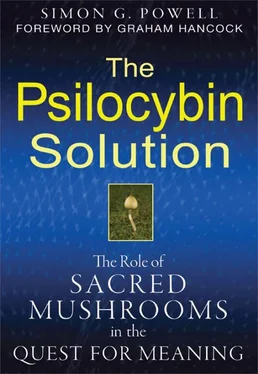Evolution is precisely an information-gaining process and can be considered a form of natural learning. As information is built up within the biosphere and its gene pools, uncertainty is reduced, the result being specific organisms with specific behaviors and specific relations to the environment. The natural intelligence that is life has learned to express itself through the language of DNA, has learned to utilize the sun’s energy through photosynthesis, has learned to fly through wings, has learned to breathe, sleep, dream, think, communicate, reproduce, recycle, and so on. The evolution of the tree of life therefore represents a natural learning process that is inscribed in DNA and that emerges in response to an environmental context that serves to elicit the learning.
Natural Intelligence Is Everywhere
Although natural intelligence becomes apparent everywhere we care to look in the natural world, the modern version of Homo sapiens seems to miss it. If, say, we were to venture into a desert and stumble across some strange, whirring, solar-powered machine that transforms sand into circuit boards so that it can replicate itself, repair itself, and even reproduce, then we would certainly take notice and infer that the machine embodies some measure of artificial intelligence. Yet if we later stumble across a hardy cactus quietly converting sunlight into usable energy and constructing reproductive organs that cunningly lure insects into transferring its pollen, then we immediately infer it to be “merely” the result of natural selection and not of intelligence. No doubt we would pass over the cactus and return to the ostensibly more interesting manufactured machine. To date, most scientists stubbornly refuse to equate the process of evolution with intelligent information processing, despite the fact that the most complex things we know of are living organisms.
Recall Mr. von Neumann. He was considered a highly intelligent man because, among other things, he showed that in principle, self-replicating machines could be built. Von Neumann was himself a replicating machine, albeit of the organic kind. Why should he be considered intelligent while the process that generated him is not? Given the fact that, like us, von Neumann was built of a hundred trillion cells tightly woven into a triumph of organic engineering, the case for natural intelligence becomes even more conspicuous. Nothing von Neumann did came anywhere near matching the genius of evolution itself. Only the human ego can deny this. And yet the human ego is itself dependent in some way on the human cortex for its existence. And we already know how brilliantly Nature has designed the cortex.
Let us also consider photosynthesis a tad more closely, embodied as it is in the green film covering the Earth. Without this downplayed biomolecular wizardry (which has yet to be technologically mirrored in a globally viable cost-effective way) there would be little life at all, for almost all life is based on this ultrasmart process. Because photons (of which light consists) behave sensibly and have sensible energetic properties, biological photosynthesis can evolve in response to this (just as dolphin biology and shark biology have evolved in response to the sensible properties of water). Yet it is easy to play the imagination game and hypothesize a reality in which organic chemicals could not in any way form themselves into neat, energy-utilizing organisms. For life to flourish it had to reside as an immanent potential within organic chemistry, and the context of the Universe at large had to be conducive to eliciting such a potential right down to the formation of suns that eventually go supernova. In short, I would argue that it is valid for us to wonder why reality is so amenable to the process of biological evolution, just as it is valid to ask why the Universe is intelligible.
Traditional Darwinism cannot adequately answer these questions. It can only shrug and state with nonchalance that Nature just happens to be that way, that Nature has been, well, lucky—lucky in the sense that it eventually brought forth conscious brains able to grasp the processes that led to conscious brains. However, if we conceive of evolution as the ongoing expression of a natural intelligence, we can connect it to those other fortunate aspects of the reality process that have allowed interesting things to happen in the Universe. Eventually we can discern that Nature is, at heart, a creatively intelligent system. Don’t forget, I am not implying some new phenomenon here or introducing something supernatural; rather, I am suggesting that overall, in its entirety, Nature is a smart system and that biological evolution is a direct consequence of this. Such a view, such a new angle through which to conceive reality, is not merely a case of words, but an attempt to redefine our place within Nature and to reappraise the significance and meaning of our conscious existence.
I think there are three principal reasons why evolution is not generally viewed as an intelligent process. First, intelligence often has connotations of consciousness, and many of us would doubtless find it hard to attribute consciousness to Nature (at least akin to the kind of consciousness we have). Second, evolution happens over lengthy time spans, as opposed to the relatively short time spans over which human intelligence operates. Third, we are a terribly proud and arrogant species that likes to imagine that we ourselves are the smartest thing on two legs. Intelligence belongs primarily to us and not to the more abstract systems of which we are a part (I presume that this outlook is connected to the human ego, as alluded to earlier).
However, intelligence, when understood as a process, does not necessarily entail consciousness (intelligence can also be unconscious ), nor does it have to be limited in its method or time span, nor should it necessarily be confined to brains alone. If intelligence is tied up with information-gaining processes and learning, then clearly evolution is natural intelligence at work. Life on Earth, in all its manifold organismic glory, has ably learned how to live, cope, and behave sensibly—that is, life has mastered the subtle art of sustainability. The only real difference between this kind of natural acumen and human acumen is in magnitude and success.
Reductive science does not recognize natural intelligence because reductive science looks to isolated entities and attempts to seek explanations for their existence on lower levels. To glimpse natural intelligence is to view the larger system of which the components are a part. This larger system is, ultimately, the entire Universe, a specifically configured backdrop that provides the essential conditions necessary to promote the digital computational procedure that is evolution. These essential conditions are things like the sensible flow of energy throughout the Universe; the convenient formation and enduring presence of suns; the facilitated formation of DNA, with its conveniently plastic and linguistic nature; the continual presence of factors that conveniently induce DNA to vary and mutate; and, most important of all perhaps, the instructive nature of the environment that ensures DNA can be expressed in ever-more sophisticated ways. If we contemplate in large-scale holistic terms, then natural intelligence emerges. Darwin’s groundbreaking legacy therefore resides in his discovery of the methodology of natural intelligence.
Superfluous Icing on the Darwinian Cake?
Some might object here and claim that to infer that evolution represents an intelligent process is to introduce superfluous and scurrilous gossip-making baggage into what is already a sufficient theory. In other words, why infer natural intelligence when it is not absolutely necessary to use such terminology for our understanding of the mechanisms by which evolution proceeds? Well, this might be true, yet to refuse to elaborate on evolutionary theory is to impose limitations on our understanding, especially if we desire a holistic and metaphysically satisfying view of Nature. Perhaps this is why there have been so many attempts to do away with Darwin’s theory, not because it is wrong but because there is some conceptual element missing, an element that can more properly capture and appreciate the amazing power of evolution.
Читать дальше










